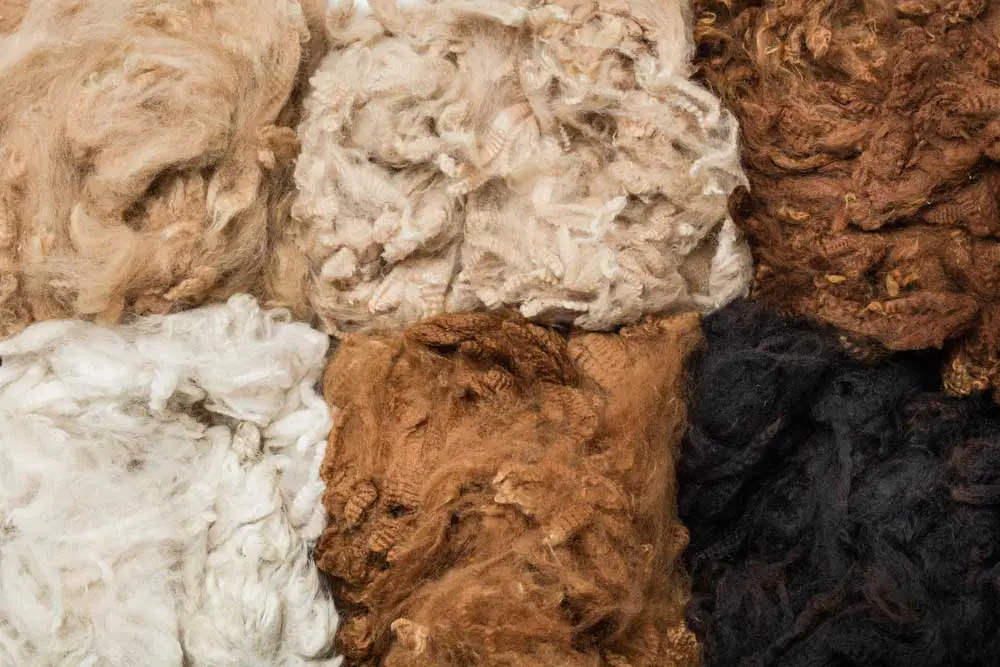You cannot think of winters without wool. It is the ultimate choice for freezing weather to protect you from the cold winter air.
Some people think that wool comes from sheep, although it’s true but wool doesn’t only come from sheep, but also other animals like goats, rabbits, bison, alpaca, etc.
Today we will talk about alpaca wool, how much warmth it provides and is it really warmer than wool?
One distinction that should be obvious by now is that merino wool is derived from a specific breed of sheep, regular wool is derived from a variety of sheep, and alpaca wool is derived from a camel-like animal known as an alpaca. What they all have in common is that these various wools keep you warm.

However, alpaca wool is warmer than regular wool. Alpaca fibres have a distinct physical structure with regular hollow spaces throughout. These hollow spaces trap air, which boosts the thermal characteristics of the fibre and offers a warmer sensation for the wearer.
This semi hollow structure also makes alpaca fibres incredibly lightweight, providing more warmth for the weight than regular wool of the same fibre size.
So what makes alpaca wool better than regular wool?
1.) They’re softer than regular wool
Alpaca fibres have a softer, smoother texture than merino fibres, making them less itchy while wearing.
They also naturally lack lanolin, which is an allergen for some people and is naturally present in large quantities of sheep’s wool.
Alpaca wool is non-itchy, warm, and outperforms merino and other types of wool. As a result, it is ideal for outdoor apparel, hiking socks, and even undergarments.
2.) They retain less water
Alpaca fibres are water resistant and incredibly breathable. This is because of the hollow fibres that lets them trap more heat and push away moisture from the skin, keeping you warm.
Water almost disappears due to the structure and warmth of alpaca fibre. As a result, while alpaca is not waterproof, it is water-resistant.
Wool, on the other hand, can absorb up to 50% of its own weight in moisture, although it has a maximum limit.
Unfortunately, perspiration can accumulate adjacent to the skin when wool is soaked. This might result in discomfort and foul stink.
3.) They’re strong and durable
The fibres of alpaca wool are soft, lightweight, and smooth. Despite this, this fibre is extremely strong and long-lasting.
Alpacas have long been living in the extreme winters of the Andean mountains, therefore, these creatures are robust and powerful.
It’s no surprise that Alpaca fibre outlasts most other fine fibres, including wool, cashmere, and silk.
4.) No negative impact on the environment
To make it soft, wearable, and washable, alpaca fibres are processed into fabric without the use of harsh chemical treatments or additional synthetics, such as those used in merino.
Many lightweight merino clothes are blended with synthetics like nylon to improve performance, and synthetic fabrics have been shown to contribute to microplastic contamination in the environment.
Furthermore, when compared to sheep, which have been demonstrated in studies to have a considerable environmental impact, rearing and grazing alpacas has a relatively minimal environmental impact.
Here’s a quick comparison chart between wool and alpaca for your better understanding:
| Features | Alpaca wool | Regular wool |
|---|---|---|
| Origin | Alpaca | Sheep, goats, rabbits, bison, etc |
| Softness | Does not irritate the skin and is extremely soft | Can be rough on skin and cause irritation |
| Weight | Lightweight | Not as lightweight as alpaca |
| Fibres | Hollow | Solid |
| Hypoallergenic nature | Non-itchy and non allergic because they lack lanolin | Can be itchy and uncomfortable because it contains lanolin |
| Insulation | Excellent, due to hollow fibres | Good, but not as warm as alpaca |
| Strength | Stronger than regular and merino wool | Not as strong as alpaca |
| Water absorption | Water resistant, therefore it repels water | Absorbs upto 40-50% of its weight |
How does alpaca wool keep your body warm?
To answer, you must first know the livelihood of alpacas and where they come from. Alpacas dwell in the Andean mountains, where temperatures go down until it’s freezing cold.
Sheep live in more temperate climates, and while they are robust enough to withstand a lot of cold, alpacas undoubtedly win this fight with their soft wools.
So, alpacas keep you warm because of the following reasons:
1.) Structure of fibre- The hollow fibre structure of alpaca traps air.
Wool fibres are excellent insulators because they are not straight but instead have a tiny wave throughout their length and it is this waviness of the fibres that traps tiny pockets of air between the threads in a weave, which are heated by your body, therefore, keeping you warm.
Also, the internal structure of wool might have an effect on warmth.
2.) Water resistant features- Alpaca wool is extremely water resistant.
It not only absorbs a huge amount of its own body weight, but it also wicks away the majority of the water before it enters the fibre, therefore, the hollow fibre works to evaporate any extra moisture that has made its way inside.
See also: Best Waterproof Work Jacket for Men and Women
3.) Resistance to wind– Depending on the stitch and pattern used for your clothing, alpaca wool provides a decent level of wind resistance.
The tighter and stronger a garment is knitted, the more protection it provides. Wind resistance is essential for avoiding cold winter winds.
How to care for your alpaca wool products?
Hand washing is the ideal way for caring for your alpaca fabric. This is owing to the fact that hand washing cloth is gentler than machine washing it due to reduced agitation. If there are stains that you can’t get rid of, it is advisable to dry clean it.
Here are a few tips as to how can you wash your alpaca:
1.) Warm water along with mild soap or detergent should be used.
2.) It is not advisable to twist your alpaca fabric to get rid of excess water.
3.) Instead, roll the cloth in a towel and gently push it out to let the towel absorb the excess water.
4.) Allow the cloth to air dry. Using a dryer might cause fabric damage.
5.) Do not hang your alpaca fabric since it will lose its form, it is advisable to fold them.
Few things you should know before purchasing alpaca:
Where there are various benefits to Alpaca wool, there are also some drawbacks too. Alpaca wool can be possibly irritating, especially for people who have sensitive skin. Because of its stiff fibres, it may itch and cause discomfort.
Also, it is one of the most costly fabrics available which requires more specific maintenance than other wool fabrics.
Conclusion
As you can see, alpaca fleece offers better quality in terms of softness, warmth, and moisture wicking capabilities than wool, while also being hypoallergenic and eco-friendly. Although, both are excellent fabrics for keeping you warm.
We have tried to include all the necessary details you would require to properly distinguish between the two so that you make an informed choice before purchasing.







